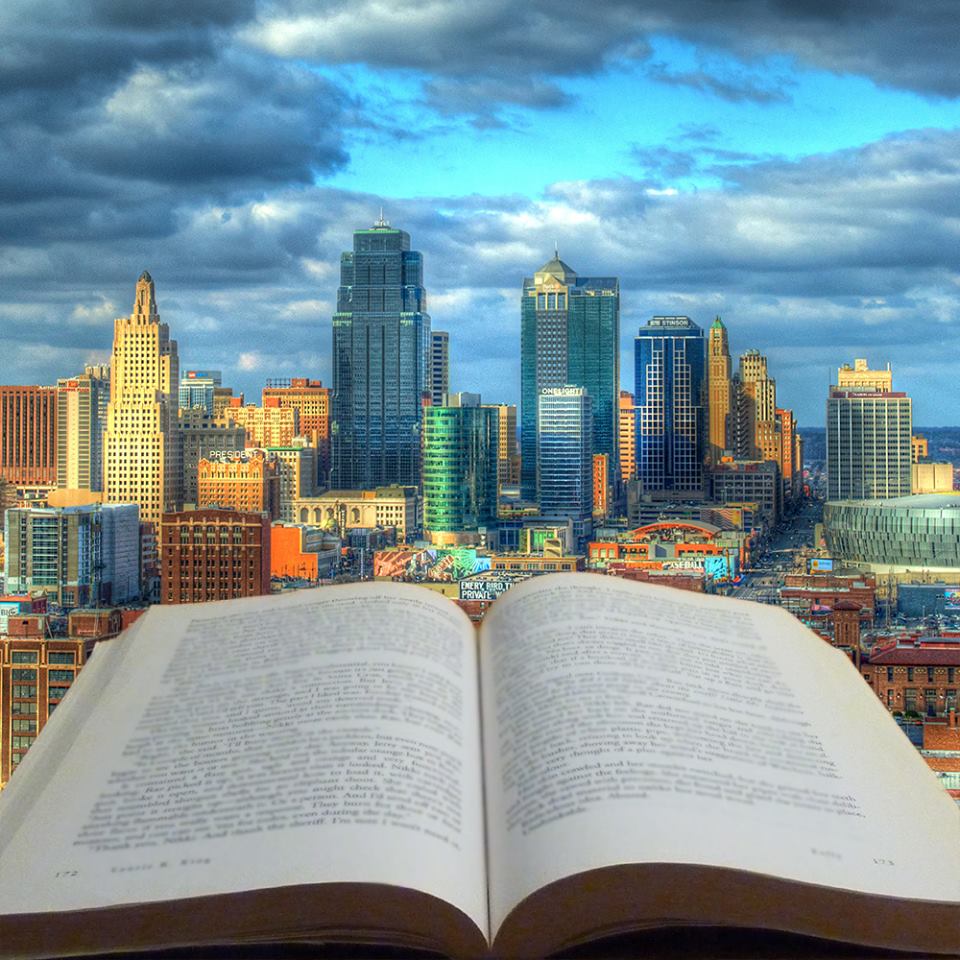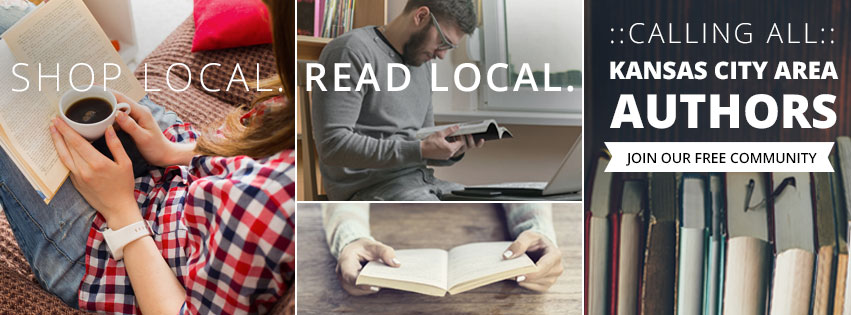 I mentioned in a recent post that I’m a part of Read Local Kansas City. I am also a part of another “read local” organization—Hometown Reads, which lists books by local authors in many cities across the U.S. Go check out this site and see what books have been written by your hometown authors—you might find a gem.
I mentioned in a recent post that I’m a part of Read Local Kansas City. I am also a part of another “read local” organization—Hometown Reads, which lists books by local authors in many cities across the U.S. Go check out this site and see what books have been written by your hometown authors—you might find a gem.
Hometown Reads wants to learn more about people’s reading habits, and they have a few questions for readers. These questions include:
- When do you read books?
- How do you choose the books you want to read?
- Do you read print books or ebooks?
As I’ve noted in earlier posts, I’ve been a life-long reader. While there were periods in my life when I didn’t read for pleasure, it has been my first source for entertainment since I was four or five years old, and even earlier when my parents read to me.
When do I read? Any time I can. As a child, I read in the afternoons during the school year when my homework was done. And I read all summer long, devouring six to ten books a week.
During the years I was in college, law school, and employed full-time, I had little time for reading. But it was my guilty pleasure to curl up with a book on an occasional weekend afternoon, though I had work to do, kids to feed, and laundry to fold. On weekends when my husband was away on Naval Reserve training, I could get through a book or two, and I often did.
Now that I’m retired, reading is no longer a guilty pleasure, just a pleasure. Though at times I feel guilty, because I have a blog post to write or a critique partner’s chapter to edit or groceries to buy. Daily life continues to intrude on time I’d like to spend reading. Or writing.
How do I choose what to read? I’ll read whatever books come into my hands. I frequently receive books as gifts. Some family members give me books they think I’ll like. Others give me books they think would be “good for me.” One nephew works in an independent bookstore, and he finds unusual books that suit my interests, like this year’s gift, West of the Revolution: An Uncommon History of 1776, by Claudio Saunt, which is awaiting my attention.
I read literary bestsellers. I read books that friends recommend (which have led to some very good finds, like Lilac Girls, by Martha Hall Kelly, and The Last Days of Night, by Graham Moore). I read books for my book club, and I read books that other book clubs are reading. I read books that our local library selects for community-wide “Big Reads.”
I read them all, or put them in a stack “to be read.” Most of the books in my stack I eventually read. Others I don’t, which makes me sad.
When I’m browsing, whether in a bookstore or library or online, I often look for books by authors I love. Those tend to be genre books in series, whether they be thrillers or mysteries or romances. But any book with an intriguing cover, or one I’ve read a review of, might get picked off the shelf and find its way into my stack.
The problem isn’t finding books to read, it’s making the choice between books.
Print or ebooks? I’ve addressed this question in earlier posts. I’ll read both, but I’ve switched largely to ebooks, except for books I’m given, books I can’t find in ebook format, and occasional forays to the library. The reason? My budget and my bulging purse. I can carry a tablet with Kindle, Nook and Overdrive apps loaded on it, each giving me access to dozens of books, or I can carry a single paperback, which gives me no choice of reading material when I’m stuck waiting in line or for an appointment. The Overdrive books from the libraries I belong to are all free, as are many Kindle and Nook books. Otherwise, my reading habit would break the bank.
And I can read on my tablet in the dark. That’s my new guilty pleasure. Waking in the middle of the night gives me the opportunity to read a chapter or two before I fall asleep again. I put on the blue light filter and read without bothering my husband.
What about you? What’s your answer to the questions posed above?


I read for an hour each day while on my treadmill or elliptical…I look forward to working out. 🙂 Before I go to bed, I try to read, but typically fall asleep quick. Often if a book is recommended I’ll read it. Truthfully, I’ve got more books than I could ever read, but it’s a great problem to have, right? Paper books will always be my favorite, but the Kindle is perfect to use while running on the treadmill. Also, with my deteriorating eyes, I can make the font huge.
Jill, you’re better at exercising than I am! I use the elliptical two or three times a week, and I like it only because I can read. And, yes, having too many books to read is a good problem to have (though frustrating).
Theresa
E-readers have so many other great features besides compactness and nightlights. You don’t have to carry a dictionary for words that the meaning is not readily apparent (I’m sure this has never been a problem for you, Theresa.) The dictionary is built in. Of course, Kindle on your smart phone is also very compact and convenient for forays into the world. And it will open your latest book at the same point you left it on your Kindle/Nook/iPad/etc. Particularly handy for those times when you do forget your E=reader.
Ever run across a character in a book and think “I’ve seen this one earlier, but don’t fully remember what happened.” Click on the name, search in the book and all places where the character shows up appear for you to peruse. Look them over, then just click back and you’re at the place you were last reading in the book.
E-readers are easy to prop on their side while reading in bed. Never have to worry about it flopping closed, losing your place. Don’t have to wear out your arm holding it to keep from closing. Do have to know how to lock it in portrait or landscape mode for sideways reading to defeat the built in automatic accelerometer that makes it always want to face “up”.
Clicking on a place name, slang word, or other item in which you’re interested allows searching information on it on the Internet, right from your reader. Read “Lock Ness”, click on it, and find out more in Wikipedia, or whatever. Then click the back arrow, and you’re back into the story.
Ereaders may not flop closed (though I have a cover on mine, so it does), but they can smack you in the face when you fall asleep while reading. I have done that!
And I agree about the dictionary and Wikipedia links — I’m more curious about what I read when I have those tools at my fingertips. I’ve also been known to touch a word on a paper page thinking the definition will pop up.
Theresa
I have several books on my e-reader, books I seldom read but think I may want to so download. The tactile feel of a book in my hands is important to me as is being able to flip back a couple of pages to refind a paragraph I like. Yes, I know you can do that with e-readers, Keeping a packet of Post-it tabs next to a book is my solution.
Often I find books when I’m researching something. One of my latest finds was a book about Admiral Beaufort who devised the Beaufort Wind Scale in the 1800s. I think I found him on Wikkipedia after searching for wind while working on an essay of wind and wanderers. Yes, I know. That’s pretty weird. I also read the New York Times Book Review and salvage titles from that.
Unfortunately, I don’t set aside a reading time each day and time gets away from me. But I seem to be either reading something or writing most of the time!
Nice post, Theresa.
To be reading or writing most of the time is a good life!